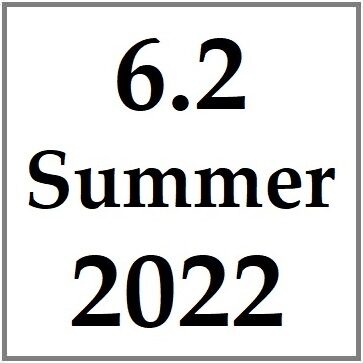"Any chance you want to work on this together? I mean, taking on more seems like a poor choice, but this looks cool"
Jenna Morton-Aiken and Dani DeVasto
Keywords: parenting, parent death, academic motherhood, scholarly publications, writing, discourse communities
Categories: Parenting and Possibility in Impossible Times; As If the Pandemic Wasn’t Enough: Tales of Loss and Grief; Building Community in Isolating Times
Content warning: parent death

Image 1: Email from Jenna inviting Dani to collaborate on CFP despite having a toddler and newborn at home.
Despite being friends for six years, we co-authors have never met in person. Put in touch by a mutual mentor looking to support us as then-pregnant graduate students, we have corresponded by email, text message, Google Docs, and phone. We have never written together before, instead usually writing toward each other as we traversed pregnancies, dissertations, job markets, and all kinds of teething problems. Until March 2020, we spoke occasionally, relying mostly on local networks for parenting support and academic networks for professional support. And then COVID-19 hit, and our texting relationship deepened nearly overnight as we struggled to cope.
In the then-new pandemic hellscape, our identities as academics and moms were abruptly and constantly overlapping. We imagine this painful, forced evolution was not unique to us, and that multiple identities were colliding and chafing for all kinds of caregivers. We look forward to reading about those perspectives and share this piece that speaks from our experience as academic mothers struggling during COVID-19. Jenna has two young children, while Dani had two at the start of the pandemic and four under five years old by December 2021.
This piece shares our text messages and emails as examples of how we, as two very smart and accomplished women, struggled to keep it together. We made our own meaning and our own way of being in the world so we could get through it all. Multimodal composing, even just to each other, gave us a way to be our own discourse community. And then we wrote this awkward messy piece, because we wanted others to know how writing, informal and non-scholarly writing, helped nourish us in difficult times:

Image 2: Text from Jenna checking in with Dani early in the pandemic. Dani’s daycare options have collapsed and both are struggling with academic and parenting duties.
When the reality of the pandemic set in, our typical networks felt out of reach, especially with professional connections where we hesitated to reveal our struggles as pre-tenure mothers. Out of necessity, we turned further to each other. No one wants to admit they’re a wreck, but our existing friendship based on texts and emails meant we were able to “break the seal” and talk openly about the stress and tension. We began texting regularly about the special nexus of academic-parenting life that neither our personal nor professional networks could fully understand—everything from Zoom teaching and office hours conducted with children slinking (or screaming) across the screen to toddlers stealing the mousepad out from under our hands while we revised manuscripts to our inability to leave the workforce to return later. We were (and still are) convinced that if we were to give up our tenure track appointments, we would likely never secure those positions again.
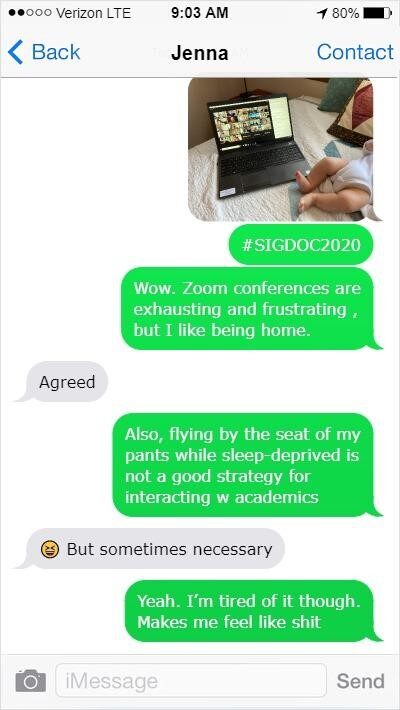
Image 3: Dani texts Jenna with a picture of a Zoom conference on a bed next to a baby.
In some ways, new circumstances presented positive new opportunities, like virtual conferences, that meant we didn’t have to actively deny our identity as parents. As Dani’s photo in the above text message shows, we could be both parents and academics in the same breath. And yet, we still felt the pressure to act like we weren’t mothers while being academics. Like Dr. Gretchen Goldman, PhD, we struggled to appear professional onscreen even when pantless and surrounded by children’s toys:
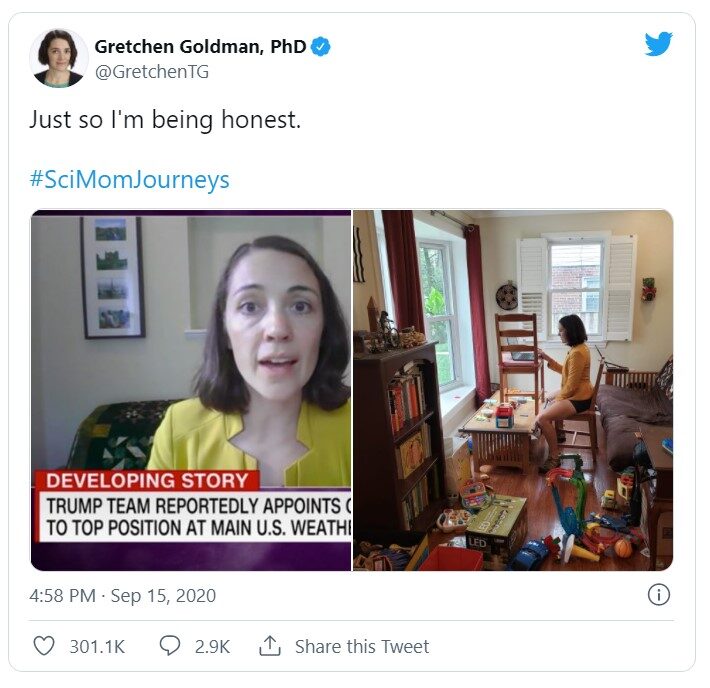
Image 4: Dr. Gretchen Goldman’s 2020 tweet showing her on the BBC in one picture and a full shot of toys covering the floor beneath her in the other.
We were already experiencing what the reports would later indicate—increased carework was shaping our academic and writerly lives. As early as May of 2020, Colleen Flaherty reported on women’s falling journal submissions rates, citing researchers Philippe Vincent-Lamarre, Cassidy R. Sugimoto, and Vincent Larivière, who wrote, “We are all in the same storm, but not in the same boat. The scientific workforce has moved en masse into the home, where male faculty are four times more likely to have a partner engaged in full domestic care than their female colleagues” (2020, n.p.). Flaherty’s Insider Higher Ed article examined the demands of parenthood on women, noting that “Without meaningful interventions, the trend is likely to continue.” Kasymova et al. reported back in May 2021 on the effects in “Impacts of the COVID-19 pandemic on the productivity of academics who mother.” They found that “since the start of the COVID-19 pandemic, the pressure on academics who mother is immense particularly regarding institutional expectations, family life, and [ineffective] proposed solutions” (419).
These studies confirm what we have felt throughout the pandemic: even with supportive and caregiving spouses, the burden of caregiving during COVID-19 was increasingly detrimental to our abilities to pursue our professional goals:
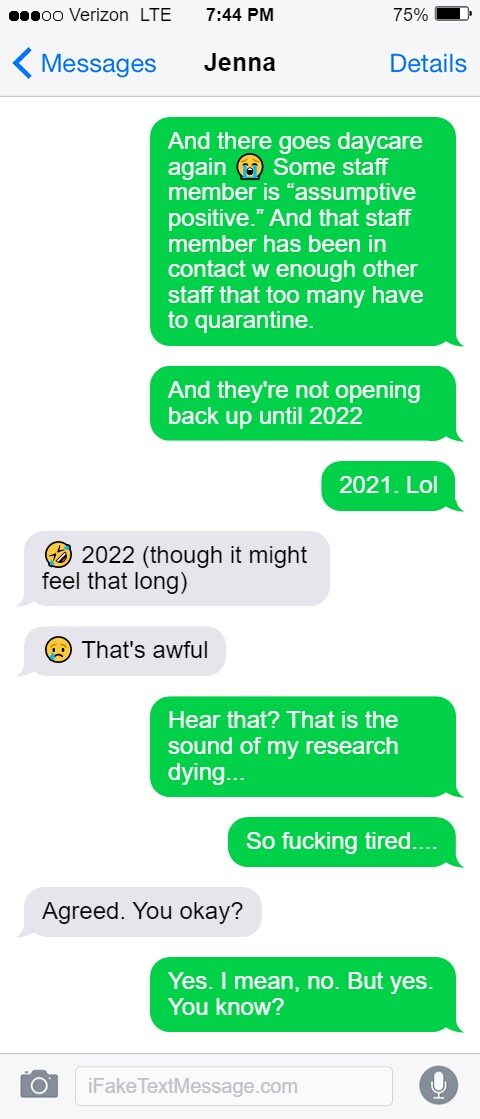
Image 5: Dani and Jenna commiserate via text about how COVID continues to affect our productivity well into 2021.
The ongoing and escalating demands of COVID-19 exacerbated the existing demands of family life. We had already been balanced on a knife edge, but now the pandemic had left us without any additional bandwidth. Coping with normally difficult events, like the death of an adult parent, had been difficult before but now felt impossible:
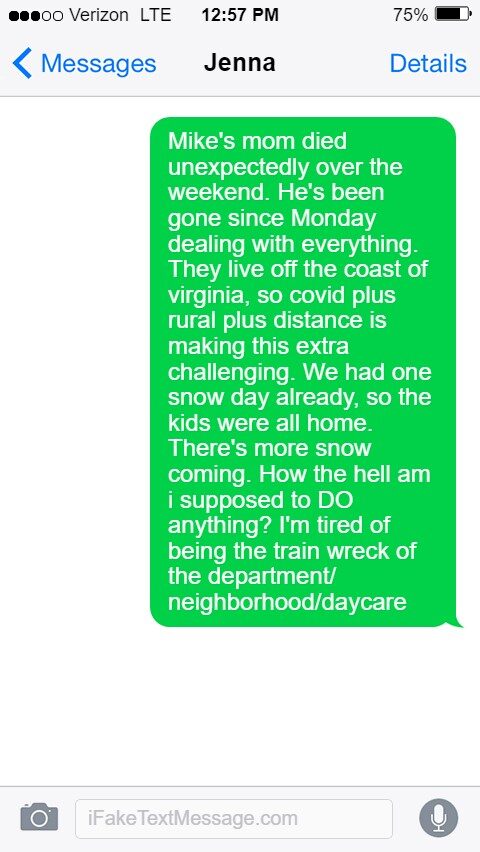
Image 6: Dani texts Jenna to say her mother-in-law has passed away, straining the already-precarious balance.
But even as we struggled to keep all of the current balls in the air, old ones returned like unwanted Golden Snitches:
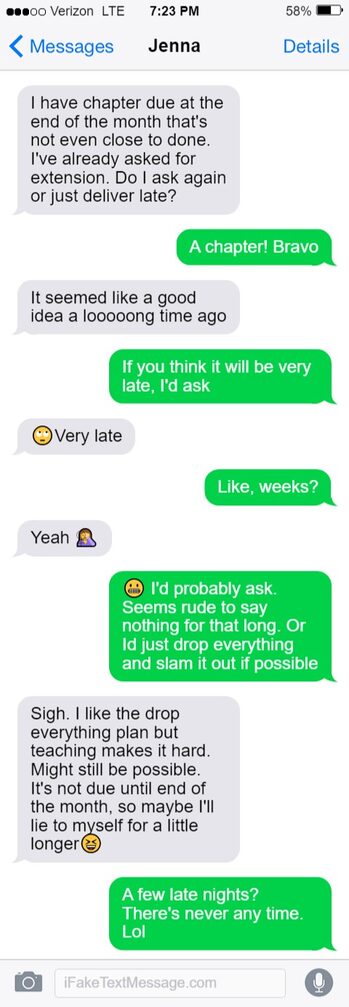
Image 7: Jenna texts Dani for advice on how to manage a late publication without neglecting herself or children anymore.
The world seemed to be inching towards a vaccine, and life began opening up again. As the months went by, we were pushed closer to tenure binder submission and felt the pressure to do more than “simply'' survive:
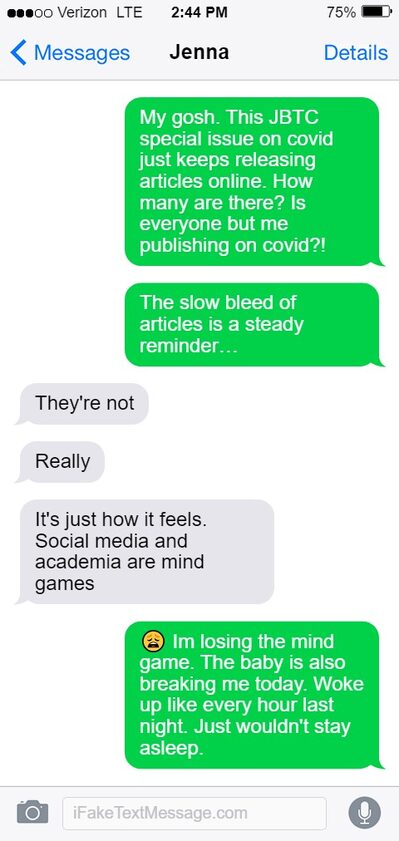
Image 8: Dani texts Jenna, stressed that everyone else is publishing on COVID except her, but she can’t even try to publish with a baby waking every hour.
We watched multiple special issues on COVID come out, reacting with varying degrees of anger, self-loathing, frustration, and panic at our inability to produce more in a system that definitely didn’t feel built for us. Jenna tended to rage against the machine in messages that we don’t want to share here, while Dani started a spreadsheet to analyze the machine that we also aren’t ready to share here.
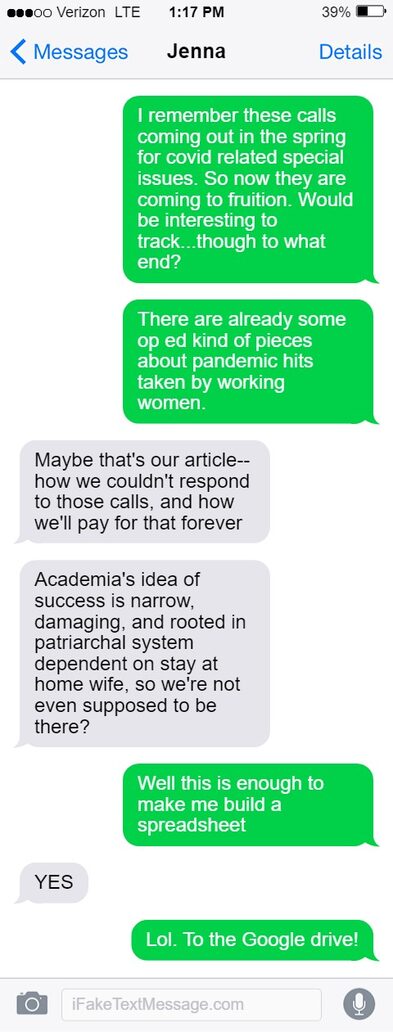
Image 9: Dani and Jenna brainstorm via text to see if they can develop a research project.
We struggled through email and texts to put together a solid analysis of the publications we saw coming out during the pandemic as we cared for our young families, our students, and ourselves (mostly in that order). We didn’t know what we were reaching for, but we wanted to make something that would help us and others understand our new academic-parenting reality. And get the publication that would help fill out our CVs and tenure dossiers.

Image 10: Jenna texts Dani to say that she wants to invest in this research project but doesn’t know if she can; Dani agrees.
Woefully short on time and brain space, we also struggled to find ways to respond to the new CFPs we saw coming out. By November of 2020, we knew we had something to say, but couldn’t find a way to say it that wouldn’t leave us even more depleted.
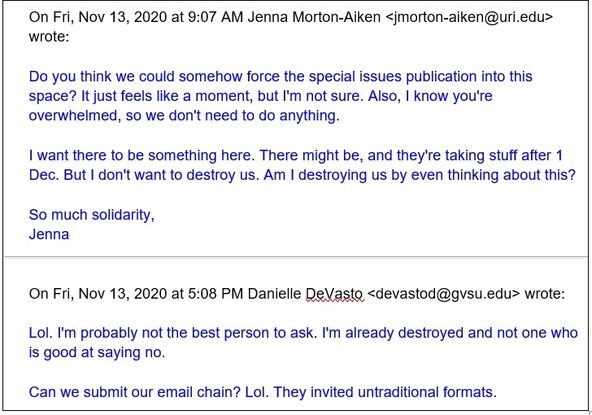
Image 11: Jenna emails Dani to ask if they can find a way to contribute, and Dani suggests submitting email chairs as a nontraditional format.
Our conversations continued to move easily among family, parenting, teaching, and research, feeling the demands of them all at once.
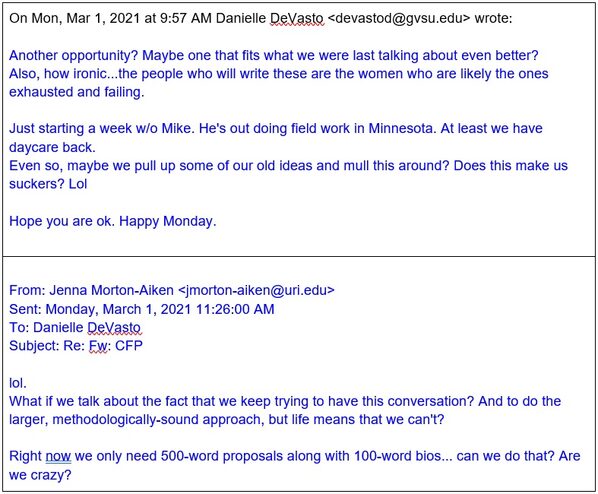
Image 12: Dani emails Jenna about another CFP while dealing with a spouse away for work. Jenna thinks they can do it, but also asks if they’re crazy for considering it.
The spreadsheet never came to full fruition, but the desire to contribute and the pressure to publish and not perish are still present.
Parting Thoughts
This, dear reader, this is where we would typically write an elegantly fleshed out conclusion, suturing together wayward chunks of text into something beautiful and seemingly effortless, an ending with clear takeaways and neatly packaged academic catharsis.
But this time, we’re calling BS on the beautiful and effortless. We’re choosing to leave the mess on the floor for you, in solidarity with and for all of the mess we have endured since March 2020. We’re making the intentional rhetorical choice to publish our notes for the conclusion as notes because, as Vyshali and Ruth wrote in their CFP, we’re tired.
So dear, exhausted reader, these are our rough, raw, and not at all beautiful thoughts as we send you on your way:
- We’ve been trained to be competitive, to be the best, to publish rather than perish. We’re certainly not valued by the academy for being parents, so we have to do more in order to keep up. In graduate school, and now on the tenure track, we risk being burdens or becoming liabilities if we take our feet off the gas.
- We can’t control our bodies as we did before we were pregnant/parenting/postpartum; we cannot control our children’s bodies; and now, more than ever, we cannot control the bodies of those who might endanger our children. But we can control the effort we make in our scholarly writing, and we can make our voices count for something somewhere by striving for publication. (We can also have compassion toward ourselves when those contributions aren’t perfect or aren’t necessarily publishable.)
- Difficult as it is for us to make room for our academic writing, it forces us to save bandwidth for our intellectual selves, to draw specific boundaries around the space that will not and cannot be dedicated to diapers, naps, homework, virtual karate lessons, and meal planning.
- We keep pushing ourselves so far because we’re afraid of what happens if we don’t publish. We’re afraid other parts of our identity will take over, that we’ll involuntarily become more mom than academic. Also, our egos want to see our names on bylines and growing CVs.
- COVID-19 took away our safety net in so many ways—we couldn’t rely on the school and daycare systems we had always used to cope before. Teaching became even more demanding as our students tried to learn online while struggling with their own challenges. Daily life became about surviving as parents and as educators; COVID-19 forced us to starve our researcher selves. At the time of writing, we have still not recovered and are not sure our CVs ever will.
- We feel pressure to write primarily in the forums that matter (read: well-respected academic journals), though other writing can often be more fulfilling, satisfying, and healing for us.
- Even writing this piece in the summer of 2021 has made us feel stressed, overextended, and vulnerable. But it was important to us to share our experience with you, so we did it anyway.
-----
Postscript—In March of 2022, Jenna struggled to revise this piece when her family could no longer evade COVID. Fortunately, everyone was vaccinated and symptoms were mild, but the additional caregiving and lingering fatigue put us well behind schedule. Dani continues to care for four small children as well as a husband in extensive physical therapy following a serious cycling accident. So yes, dear reader, the struggle is far from over. But we keep writing towards each other to keep our little discourse community of two alive. Writing, even just emoji hearts, continues to nourish us.
References
@GretchenTG. (2020, September 15). Just so I’m being honest. #SciMomJourneys [Tweet]. Twitter. https://twitter.com/gretchentg/status/1305974239984484353
Flaherty, C. (2020, Aug. 20). Something’s got to give. Inside Higher Ed. https://www.insidehighered.com/news/2020/08/20/womens-journal-submission-rates-continue-fall
Kasymova, S., et al. (2021). Impacts of the COVID‐19 pandemic on the productivity of academics who mother. Gender, Work & Organization, 28, 419–33.
Bio
Danielle DeVasto is an assistant professor in the Department of Writing at Grand Valley State University. Her research interests reside at the intersections of visual rhetoric, science communication, and uncertainty. Her work has been published in Communication Design Quarterly, Community Literacy Journal, Present Tense, and Social Epistemology. She is also a grilled cheese enthusiast and a reluctant fan of Daniel Tiger.
Jenna Morton-Aiken is Associate Director for Interdisciplinary Teaching Communities at the Sheridan Center for Teaching and Learning at Brown University. Her research has appeared in Technical Communication Quarterly, WPA Writing Program Administration, and other publications. Jenna helped launch SciWrite@URI and is a recipient of 2018-19 CCCC Emergent Researcher Award. She adores all things dark chocolate and actively misses Daniel Tiger now that her kids are getting older.
